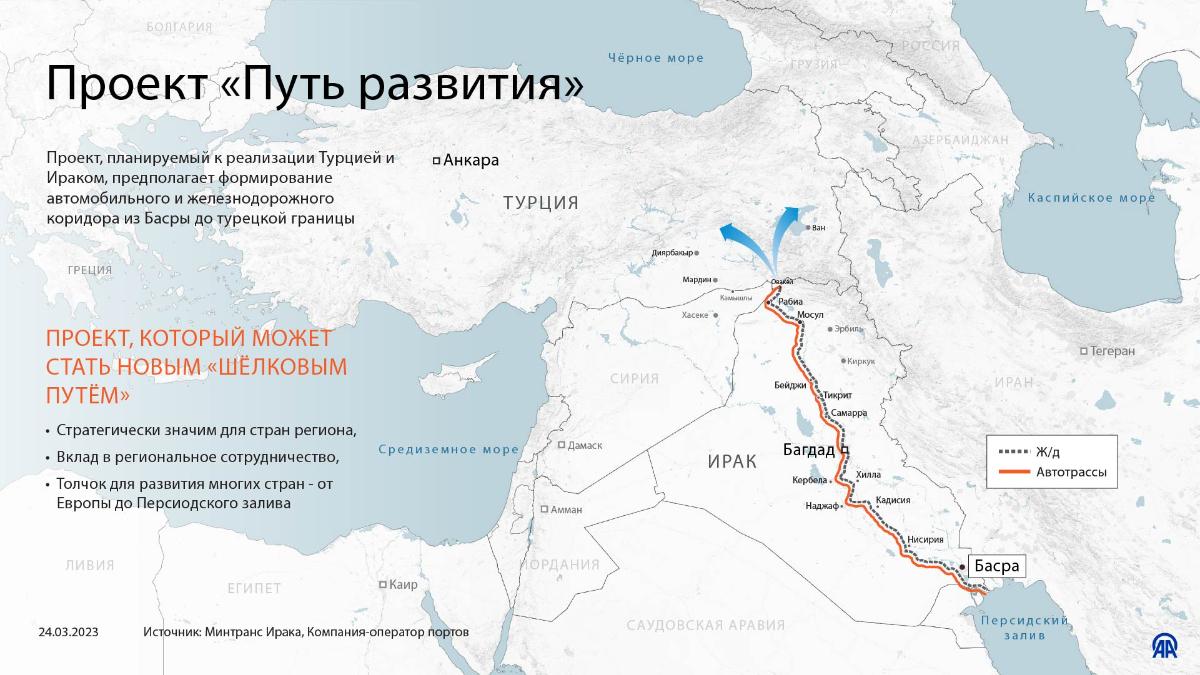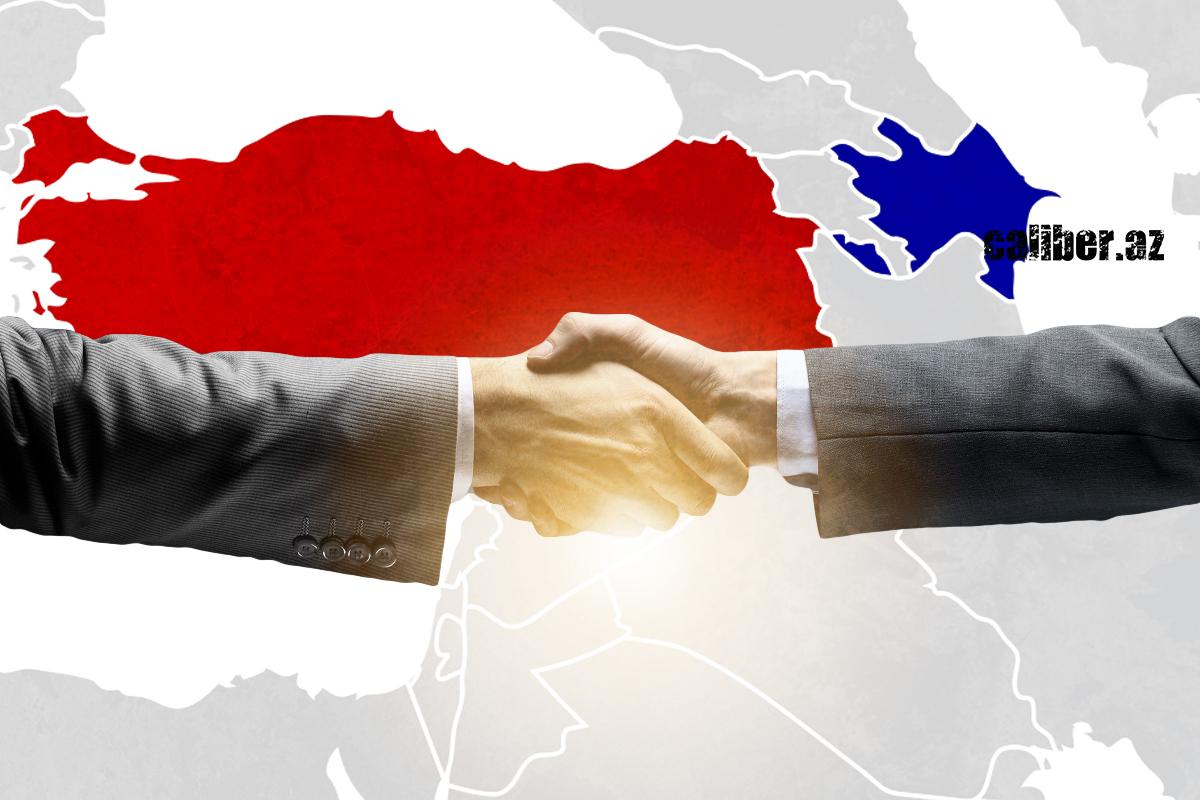The complexities of regional integration in Middle East Tensions and opportunities
Turkish President Recep Tayyip Erdogan's recent visit to Iraq was marked by the unveiling of the ambitious "Development Road" project, which aims to create a vast network of railroads and roads spanning 1,200 kilometers from Basra, the heart of Iraq's oil industry, to the Turkish border. This initiative promises to revolutionize transportation and communication infrastructure in the region.
Furthermore, Iraq has announced plans to construct the largest port in the Persian Gulf on the Faw peninsula. With an estimated total cost of approximately $20 billion, this ambitious endeavor has garnered significant interest from potential sponsors. Qatar and the UAE are currently in advanced stages of preparation to become the primary backers of the project. Just a few years ago, these two nations were staunch adversaries.
Firstly, the project is designed to facilitate the transportation of goods from the Indo-Pacific region to Europe, strengthening the integration of the economies of the respective countries. "Development Road" offers the shortest transit route for goods movement between Asia and Europe, a route that promises to be 45 per cent faster than the Cape of Good Hope route and 30 per cent more efficient than the Suez Canal route.
The latter is particularly important because the Red Sea and Suez Canal route, which used to carry about 12 per cent of world trade in the recent past, has now lost its former importance due to Houthi missile attacks on merchant ships. Thus, global trading companies and powers are now interested in new routes.
Secondly, the “Development Road” is an alternative route to another large infrastructure project proposed by the US that would also serve as a transit route for goods between the Indo-Pacific region and Europe, linking Saudi and Emirati ports, Jordan and Israel via a new network of roads and railroads. Türkiye was not called there, and this has greatly irritated Ankara. In addition, because of the war currently being waged by Israel, this project looks unrealistic for the time being.

And thirdly, the “Development Road” would allow Türkiye to dramatically increase its international influence. In this case, the country would become the most important hub for trade between Europe and Asia. At the same time, Ankara would be able to integrate its economy with Iraq and the powerful Sunni Arab monarchies of the Persian Gulf. All this is especially important for Türkiye at a time when its economy is experiencing certain problems.
Continuing the same line on regional economic integration, Kuwaiti Emir Meshal Al-Ahmad Al-Jaber Al-Sabah, accompanied by a delegation of high-ranking officials, visited Ankara on May 7, where he met with Turkish President Recep Tayyip Erdogan. The visit was aimed at economic and defence cooperation.
Currently, trade between Türkiye and Kuwait has reached $700 million (2023), but the two sides aim to double this figure. In addition, Kuwait invested $2 billion in Türkiye last year and intends to increase investments abroad. Kuwait and Türkiye signed six cooperation agreements as a result of the visit.
Al-Monitor reports that the agreements call for high-level cooperation in areas such as investment promotion, free economic zones, housing, and infrastructure. But perhaps most significantly, Kuwait signed a $376 million agreement with Türkiye's Baykar Technology for the purchase of Bayraktar TB2 drones.
Türkiye intends to develop its military-industrial complex, which is slowly evolving into a self-sufficient ecosystem. But this ambitious plan requires many billions of dollars in exports. Last year, Turkish arms exports exceeded $5 billion, up 20 per cent, but Ankara is pushing for more. In the summer of 2023, Baykar signed the largest defence deal in Turkish history with Saudi Arabia. Kuwait is one of the leading arms importers in the world, so Ankara is exceptionally important in this capacity as well.
The growing economic and military-industrial integration of Türkiye, Iraq and the Arab states of the Persian Gulf is a tricky issue, as the region depends on the delicate balancing of interests of various powers. Saudi Arabia and the Emirates severed diplomatic relations with Qatar a few years ago and declared a blockade of this small but extremely gas-rich state. The reason was that Qatar supported the Arab Spring uprisings and the Muslim Brotherhood, while the Saudi and Emirati monarchies saw these movements as a threat to their existence. At the same time, Kuwait was criticized in the same spirit, although the confrontation did not reach such a degree of confrontation. Today, the crisis between these Arab countries has been largely overcome, but what will happen tomorrow?
Anakara actively supported Qatar, actually creating a military-political and economic alliance with the country. Türkiye built a military base on its territory and entered into a tough conflict with the UAE and the Saudis. The air clearly smelled, if not war, then a major clash of powers. In recent years, however, both Erdogan's policies and those of Prince Mohammed bin Salman, the ambitious leader and de facto ruler of Saudi Arabia, have changed; the same can be said of the UAE. There is a clear rapprochement between the Arab countries of the region and Türkiye.
It seems that, having come close to an armed clash, the powers of the Middle East - both the Turkish-Qatari bloc and the tenuous Saudi-Emirati alliance (both countries have major disagreements over Yemen) - have decided that they need détente. Investments in transport corridors, defence industry and other integration projects are supposed to be the basis for détente.
Iran, a geopolitical rival of both Türkiye and the Saudis, could be another obstacle to regional integration, including the “Development Road”. Although even here there is a rapprochement between the countries - notably the March 2023 China-brokered deal to normalize relations between Saudi Arabia and Iran. Nevertheless, there are extensive tensions between states vying for influence in the Persian Gulf.
The situation between Ankara and Tehran is even more complicated. In Syria, Iran sides with the regime of Bashar al-Assad, while Türkiye supports the anti-Assad armed opposition. In Iraq, Türkiye is waging an offensive against the PKK (Kurdistan Workers' Party) and has built about 100 military bases in the country, while Iran, whose influence in Iraq is enormous (it is supported by the ruling coalition in that country - the Coordination Mechanism and numerous armed militias affiliated with it), perceives these efforts as interference in the sphere of Iranian interests.
Türkiye supports the idea of the Zangazur corridor, which would link its economy, the Nakhchivan Autonomous Republic and mainland Azerbaijan, while Iran strongly opposes the project. There are other disagreements, and if they are all put together, they will turn into a box of radioactive waste that could poison the region.

Therefore, Ankara has concerns about the “Development Road”. Iran could see the project as contrary to its interests and use its influence in Iraq, and it is very powerful, to prevent the plan from being realized.
But this may not happen. The Iranian economy, which has suffered from international, primarily US, sanctions, is not going through the best of times. Therefore, the Iranians are betting on expanding both political and economic influence in Iraq. Many Iranian firms are specifically registering in this country as Iraqi companies in order to avoid sanctions. According to The New York Times, Iran was planning to move its businesses with a total capital of about $20 billion to Iraq. Iraq is extremely important to Tehran as an economic window to the world. So the Iranians might even be interested in the “Development Road”. If, of course, they derive certain benefits for themselves from this project.
The views and opinions expressed by guest columnists in their op-eds may differ from and do not necessarily reflect the views of the editorial staff.








